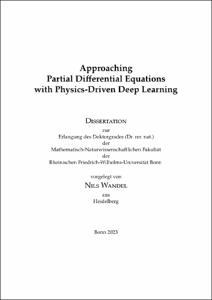Approaching Partial Differential Equations with Physics-Driven Deep Learning

Approaching Partial Differential Equations with Physics-Driven Deep Learning

| dc.contributor.advisor | Klein, Reinhard | |
| dc.contributor.author | Wandel, Nils | |
| dc.date.accessioned | 2023-12-14T14:39:38Z | |
| dc.date.available | 2023-12-14T14:39:38Z | |
| dc.date.issued | 14.12.2023 | |
| dc.identifier.uri | https://hdl.handle.net/20.500.11811/11184 | |
| dc.description.abstract | Partial Differential Equations (PDEs) play an important role in describing continuous physical systems such as fluids, air-flows, waves and many more. Thus, by solving these equations, one can simulate smoke and water effects in computer graphics, analyse lift and drag coefficients of vehicles in engineering applications, or compare experimental observations with predictions from fundamental theories in basic research.
However, in most scenarios, analytic solutions of PDEs are not available and traditional numerical solutions are computationally expensive. In contrast, recent deep-learning based methods promise great gains in efficiency by infering solutions in a single forward pass through a neural network and streightforwardly allow for parallelization on GPUs. In this work, we tackle challenges of deep-learning based approaches in the context of PDEs with respect to: ground truth data generation, neural network architectures, the generalization capability of neural networks to obtain solutions for unseen domain geometries, differentiability, speed and stability. To this end, we built on top of recent advances in physics-driven deep-learning that, in contrast to data-driven approaches, allow to train neural networks directly on the underlying PDEs and therefore alleviate the need of large ground truth datasets that are expensive to generate. We developed a novel training cycle, that, in conjunction with a physics-based loss and a training pool of randomized domains, allows end-to-end training without any precomputed ground truth data. To describe the field states of the underlying PDEs, we investigated a Marker and Cell grid representation and a continuous representation based on Hermite-splines. Our unpretentious pipeline does not rely on additional components such as a differentiable fluid solver or a particle tracer. This way, we obtained robust and accurate surrogate models that yield stable results over long time-horizons in two as well as in three dimensions. Furthermore, we developed interactive demonstrators to show the generalization capabilities of our approach in real-time. Since our models are fully differentiable, gradients can be efficiently computed throughout the simulation by using backpropagation through time. This can be exploited, for example, in inverse problems, as we have shown in a simplistic experiment on fluid control. In the future, we hope that the insights gained in this work can form a foundation for new applications that require fast, robust and differentiable solutions of PDEs such as for example real-time physics-engines for computer games or interactive computational fluid dynamics for engineering. To this end, we share the source-code for all of our publications on github. | en |
| dc.language.iso | eng | |
| dc.rights | In Copyright | |
| dc.rights.uri | http://rightsstatements.org/vocab/InC/1.0/ | |
| dc.subject | Deep Learning | |
| dc.subject | Physics-Based Deep Learning | |
| dc.subject | Computational Fluid Dynamics | |
| dc.subject | Navier-Stokes Equation | |
| dc.subject | Wave Equation | |
| dc.subject.ddc | 004 Informatik | |
| dc.title | Approaching Partial Differential Equations with Physics-Driven Deep Learning | |
| dc.type | Dissertation oder Habilitation | |
| dc.publisher.name | Universitäts- und Landesbibliothek Bonn | |
| dc.publisher.location | Bonn | |
| dc.rights.accessRights | openAccess | |
| dc.identifier.urn | https://nbn-resolving.org/urn:nbn:de:hbz:5-73536 | |
| dc.relation.doi | https://doi.org/10.1063/5.0047428 | |
| dc.relation.doi | https://doi.org/10.1609/aaai.v36i8.20830 | |
| ulbbn.pubtype | Erstveröffentlichung | |
| ulbbnediss.affiliation.name | Rheinische Friedrich-Wilhelms-Universität Bonn | |
| ulbbnediss.affiliation.location | Bonn | |
| ulbbnediss.thesis.level | Dissertation | |
| ulbbnediss.dissID | 7353 | |
| ulbbnediss.date.accepted | 27.10.2023 | |
| ulbbnediss.institute | Mathematisch-Naturwissenschaftliche Fakultät : Fachgruppe Informatik / Institut für Informatik | |
| ulbbnediss.fakultaet | Mathematisch-Naturwissenschaftliche Fakultät | |
| dc.contributor.coReferee | Gall, Jürgen | |
| ulbbnediss.contributor.orcid | https://orcid.org/0000-0002-7787-3622 |
Files in this item
This item appears in the following Collection(s)
-
E-Dissertationen (4442)




